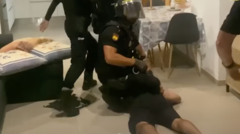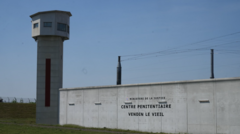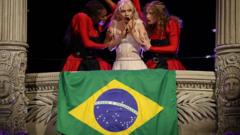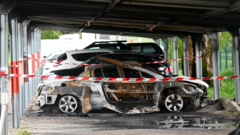The rise of the Pure Third Command gang in Rio highlights a troubling blend of evangelical Christianity and organized crime, as they impose religious beliefs on local residents and suppress other faiths. This phenomenon affects the communities' freedom of religion and raises questions about the role of faith in criminal enterprises.
The Intersection of Faith and Crime in Rio’s Drug Gangs
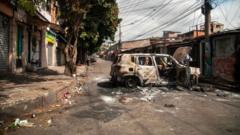
The Intersection of Faith and Crime in Rio’s Drug Gangs
In Rio de Janeiro's favelas, the Pure Third Command gang intertwines Pentecostal beliefs with drug trafficking, imposing their interpretations of Christianity on local communities.
In Rio de Janeiro, the Pure Third Command gang has emerged as a powerful force in the drug trade, notoriously known for branding their narcotics with religious symbols like the Star of David. Interestingly, this symbol does not represent the Jewish faith; rather, it is rooted in a belief held by some Pentecostals that the return of Jews to Israel will prompt the Second Coming of Christ. The gang, which now controls five favelas in the north of Rio—cordoned off as the Israel Complex—operates under the conviction that they are "soldiers of crime", and that Jesus presides over their territory.
The gang's intertwining of drug trafficking and evangelical Christianity raises eyebrows. Reflecting on these developments, Vivian Costa, a theologian and author, notes the convolution of faith and crime among these gangsters, some referring to them as "Narco-Pentecostals". The duality of their identity is starkly illustrated by the narrative of Pastor Diego Nascimento, a former member of a rival gang who found redemption through Christianity. However, he believes that genuine adherence to evangelical principles is incompatible with a life of crime. For him, this idea suggests a manipulation of faith to justify their illegal activities rather than a true spiritual commitment.
As evangelical Christianity gains traction in Brazil—predicted to outnumber Catholicism by the decade's end—its influence on marginalized neighborhoods is pervasive. Sociologist Christina Vital highlights how these areas are under siege, and gang warfare has affected the practice of diverse religious beliefs, particularly that of Afro-Brazilian faiths. Reports indicate that residents of the Israel Complex are increasingly intimidated from publicly expressing their beliefs, with threats against practitioners of Umbanda and Candomblé.
Such dynamics introduce serious implications for the freedom of religion in these regions, as criminals enforce a narrow interpretation of faith. Dr. Rita Salim, heading the Department for Racial and Intolerance Crimes in Rio police, articulates the gravity of the situation as gangs wield significant power, fostering an environment of fear that curtails religious expression.
The situation echoes a contemporary "neo-Crusade" according to Marcio de Jagun, who notes the intertwining of religious and ethnic prejudice that characterizes these violent incursions into faith communities. Historically, crime and religion in Brazil have coexisted, with gangsters once seeking protection from Afro-Brazilian deities. Costa suggests that to label this phenomenon as Narco-Pentecostalism oversimplifies the complex relationship between crime and spirituality, urging a term like "Narco-Religiosity" that better encapsulates the dual influences of faith and crime.
This troubling trend reveals an inadvertent walkaway from a constitutionally guaranteed right—the freedom of religion—as communities suffer the effects of a drug trafficking nexus that exploits faith for dominance. The intricate interplay of belief systems and criminality continues to jeopardize the ideals of societal coexistence and religious pluralism in Brazil.




